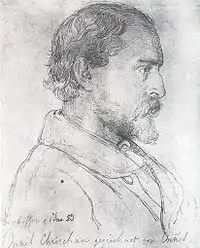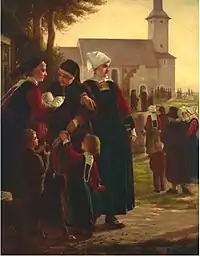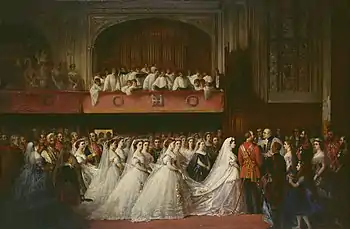Christian Carl Magnussen
Christian Carl Magnussen (31 August 1821, Bredstedt - 18 July 1896, Schleswig) was a German painter; primarily of genre scenes.

Biography
He began his artistic career as a student of Herman Wilhelm Bissen at the Royal Danish Academy of Fine Arts in Copenhagen. From 1846 to 1848, he was in Rome, where he sketched and painted scenes from daily life. In 1848, when his application for a scholarship at the Academy was rejected, he became involved in the First Schleswig War, on the German side.

Following the Danish victory, he settled in Hamburg and became a portrait painter. There, he made the acquaintance of Georg Christian Lorenz Meyer, a local politician, and fell in love with his daughter, Meta. From 1851 to 1852, Meyer financed a stay in Paris for him, during which he studied with Thomas Couture. After returning, in 1853, he married Meta.
Her inheritance enabled them to live in Rome. They stayed for seven years altogether, during which time they held an almost continual open house. Their most notable frequent guests included the painters, Ludwig Knaus, Valentin Ruths, the brothers Gustav and Louis Spangenberg, as well as the art historian, Wilhelm Lübke. They were especially good friends with the poet, Hermann Allmers. Most of the works he created there were either idealized portraits of women or scenes from Italian folk life.
When relations between Austria and Italy became strained and war appeared imminent, he took his family back to Germany and settled in Hamburg, where he once again became a portrait painter. In 1875, they moved to Schleswig, which by then had become part of Germany. Instead of painting, he focused on operating a woodcarving school and attempting to revive the techniques of the "Old Masters". He also worked on restoring carvings in churches throughout the area, but it is now the general opinion that his rigorous restorations robbed the works of their value as historical items.[1]
His activities included collecting furniture and various church pieces; over 500 in all. In 1894, when his school had proven to be financially unsuccessful, he placed his collection in the new Museum of Applied Arts in Copenhagen, as an exhibition for sale. It was purchased in its entirety by Ernest Augustus, Crown Prince of Hanover, and is now on exhibition as part of the "Cumberland Collection" at Sønderborg Castle[2] Another significant part had been acquired by Justus Brinckmann in 1887 for display at the Museum für Kunst und Gewerbe Hamburg.
Altogether, he had sixteen children from two marriages; including the sculptor Harro Magnussen, the ceramicist Walter Magnussen, and the painter and writer, Ingeborg Magnussen[3]
References

- Rudolf Jaworski, Witold Molik: Denkmäler in Kiel und Posen: Parallelen und Kontraste, Verlag Ludwig, 2002, ISBN 3-933598-41-9. S. 99 (online @ Google Books)
- "Internetseite von Sønderjyllands Museum". Archived from the original on 2012-03-30. Retrieved 2019-10-06.
- Peter Sieve (2002). "Magnussen, Ingeborg". In Bautz, Traugott (ed.). Biographisch-Bibliographisches Kirchenlexikon (BBKL) (in German). Vol. 20. Nordhausen: Bautz. cols. 967–970. ISBN 3-88309-091-3.
Further reading
- Hans-Dieter Loose: "Christian Carl Magnussen und sein Gruppenporträt des Hamburger Senats." In: Beiträge zur Schleswiger Stadtgeschichte, Jg. 18 (1973), pgs. 25–35.
- Ernst Schlee: Christian Carl Magnussen. Ein Künstlerschicksal aus der Kaiserzeit. Husum Druck- und Verlagsgesellschaft, Husum 1991, ISBN 978-3-88042-577-4.
- Ulrich Schulte-Wülwer, Sehnsucht nach Arkadien – Schleswig-Holsteinische Maler in Italien, Heide 2009, pgs.257–267. ISBN 978-3-8042-1284-8
External links
- Literature by and about Christian Carl Magnussen in the German National Library catalogue